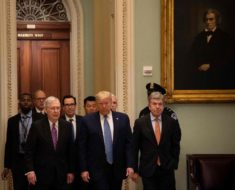In June, President Donald Trump signaled his intent to ease restrictions on Huawei. The Chinese tech company had been blacklisted by the US Department of Commerce. That move essentially made it impossible for Huawei to work with US companies. When Trump made his announcement, Congressman on both sides criticized the move. Restrictions on Huawei haven’t been loosened since then, and more regulations could be implemented.
Congressmen Step In To Keep Pressure on Huawei
A group of senators recently unveiled the Defending America’s 5G Future Act. The bill effectively blocks the US President from easing restrictions on Huawei. On top of that, this particular bill remands Huawei to the Commerce Department’s Entity List. Companies on the Entity List cannot transact with US businesses without government approval. A bipartisan group of Senators have introduced the bill into the Senate.
Bipartisan Support For Keeping Huawei In Check
Senator Marco Rubio has long been a critic of Huawei and other Chinese telecom companies. Rubio is currently a co-sponsor of the bill introduced to the Senate. In the past, he’s supported similar bills to block Chinese telecom firms from operating in the US. A similarly themed bill is being introduced in the House of Representatives as well. Congressman of all backgrounds have been critical of Huawei specifically.
Is Huawei A Threat To National Security?
The longstanding belief is that Huawei operates in conjunction with the Chinese government. Therefore, many Congressmen see the company as a threat to national security. President Trump pushes the same narrative, and Huawei’s reputation in the United States continues to degrade. Huawei originally secured a deal with T-Mobile at the beginning of 2019 before pressure from lawmakers caused T-Mobile to back out.
Huawei remains the second largest smartphone manufacturer in the world behind Samsung. The company managed to overtake Apple for the number two spot last year. Since then, most of the news for the company has been negative. Recent indications see the company laying off hundreds of workers in the US and creating its own mobile operating system. Huawei doesn’t rely on the United States for sales, but the company does depend on many US technologies in its daily operations.
Dil Bole Oberoi





